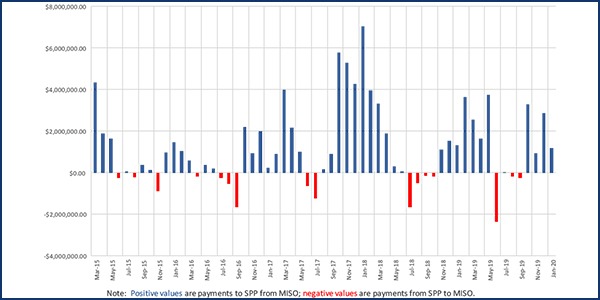SPP staff last week shared a draft congestion study with the Seams Steering Committee on the effect of MISO’s contract path to its southern footprint.
The study of the SPP day-ahead market’s external flows and solution costs analyzed whether regional directional transfers (RDTs) above the contract path capacity between MISO’s South and Midwest subregions created additional congestion or operating costs for SPP’s market. MISO is limited to 1,000 MW of contracted, firm capacity over the contract path as a result of a 2015 settlement agreement. (See SPP, MISO Reach Deal to End Transmission Dispute.)
The committee had asked staff to provide more information on the differences in the hourly redispatch level, with a look at the generation footprint broken out by state and legacy balancing authority. Staff’s limited study was inconclusive as to whether MISO’s above-capacity RDTs created a “pattern of financial harm.”
SSC Chair Jim Jacoby noted during the committee’s meeting Thursday that high north-to-south days would “probably” overstate the study’s results.
Staff will return to the committee for its April 2 conference call with a final version of the study. The SSC plans to endorse or accept the report at that time.
M2M Settlements Up to $72M in SPP’s Favor
SPP earned $1.81 million in market-to-market (M2M) settlements in January, the fourth straight month — and 43rd in 59 months — that the M2M process with MISO has settled in its favor.
SPP has now incurred $72.14 million in M2M settlements from MISO since the two began the process in March 2015. The process provides a compensation mechanism when SPP or MISO have to redispatch transmission around congested flowgates.
Temporary and permanent flowgates on the RTOs’ seam were binding for 438 hours during January. Temporary flowgates accounted for 427 of the binding hours.
— Tom Kleckner





